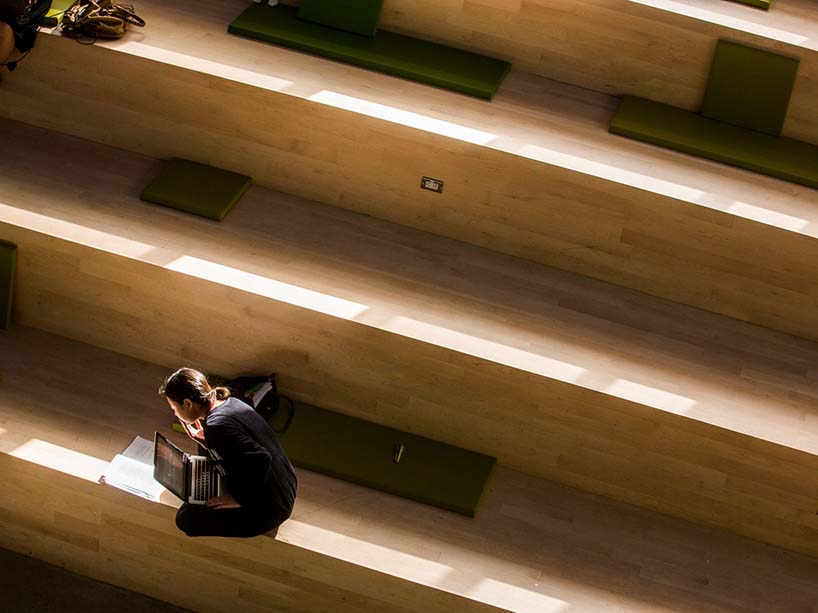Refreshing our campus mental health and well-being strategy

The Mental Health and Wellbeing Committee (MHWC) was created to establish systemic, innovative, university-wide solutions to support mental health and wellbeing.
A lot can happen in five years, and that is especially true of the recent years for mental health and well-being. Since the university's current Mental Health and Wellbeing strategy was released in 2018, Statistics Canada reports (external link) the number of Canadians experiencing a mental illness increased from 1 in 5 in fall 2020, to 1 in 4 by spring 2021. This is due in large part to the emotional and social impacts of the COVID-19 pandemic, as it both exposed and exacerbated a mental health crisis that was well underway.
Long before we were familiar with the term “social distancing,” Toronto Metropolitan University (TMU) had established the Mental Health and Wellbeing Committee (MHWC) with the goal of creating systemic, innovative and university-wide solutions to support mental health and well-being. The committee has now officially launched the strategic planning process to develop a refreshed and updated strategy, targeting completion for summer 2023.
Equipped with a clear set of objectives, the MHWC was charged with engaging the broader TMU community for guidance and input into the university’s most recent mental health and well-being strategy. At the time, the committee pointed to the ongoing importance of ensuring a common vision and intentional strategic plan. WIthin this strategy, five areas of focus were identified:
- TMU will be a safe place to live, learn and pursue excellence
- Our leadership, process and pedagogy will prioritize well-being
- Everyone will have access to physically and emotionally restoring spaces
- Everyone will have access to flexible mental health and well-being supports
- We will implement Truth and Reconciliation Commission (TRC) recommendations and support the Indigenous community to thrive at the university
Progress on commitments
Five years later, the MHWC has attained a slew of lessons learned that will inform future planning. As a result of the pandemic, many plans and initiatives throughout the university had to adjust to ensure TMU was able to continue serving students and supporting staff and faculty. This transformation impacted teaching, learning, living and working. However, the committee has found it also created opportunities that have positively impacted campus mental health and well-being, including the shift to virtual and hybrid service delivery which has improved access to mental health and wellbeing support.
Significant progress has been made towards the strategic objectives identified in 2018, through the development of principles and commitments, community resources, and community events that aim to support the mental health and wellbeing of students, staff and faculty.
In fact, looking back to the themes from that original 2018 consultation, it’s plain to see outcomes in the areas of awareness and education, access and integration:
- Awareness and education: At least 50 training sessions, workshops and teachings have been organized on campus for staff and faculty specifically related to promoting mental health and wellbeing. Evaluation results show that learning and information sharing has increased understanding and skills across the TMU community to address mental health as well as integrate equity, inclusion and accessibility into our ways of teaching and working.
- Access: The committee has also seen expansions in programming to address campus mental health and wellbeing more holistically and strengthened partnerships with community agencies that promote safety and wellbeing on campus. One of the university’s biggest successes has been the shift to hybrid service delivery during the pandemic, to ensure staff and students have access to supports on and off campus.
- Integration - Over the past three years, the principle of well-being has become more integrated into the core values of the university. It is now incorporated into the campus plan, academic plan, research plan, and a number of updated university policies. There has also been a shift in how TMU works with initiatives like Recharge and the Flexible Work policy, both created to help employees optimize their wellbeing in the workplace.
These cross-cutting initiatives have strengthened TMU as a safe place to live, learn and excel, where all members of the community can connect to physically and emotionally restorative places, as well as flexible mental health and well-being resources.
Moving forward
The process of outreach and planning has started, and the MHWC is aiming to have a new Mental Health and Wellbeing strategy in place by summer 2023. The journey to elevate and protect mental health and wellbeing on campus requires ongoing commitment and collaboration throughout the university. The MHWC has representation from across campus and collaborates to deliver initiatives like peer support programs, community partnerships and the development of spaces on campus.
Add your voice to TMU’s mental health and well-being plan
Recognizing the importance of involving the TMU community in all aspects of its work, the committee’s next phase of work will aim to gather more data and information on the current state of mental health and wellbeing within our community, to inform the next campus mental health and well-being strategy. As part of this process, the MHWC is looking to engage with students, staff and faculty to gain insights, ideas, and feedback on how to continue to support campus mental health and well-being.
Multiple opportunities to provide feedback will be available, starting with the launch of a virtual suggestion box, open now until March 27, 2023. Share your ideas to improve mental health and well-being on campus. All input is anonymous and will be shared only with the MHWC.